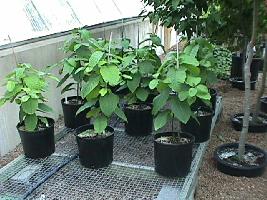|
Biosynthesis of natural anticancer compounds in plants. A model system, the Chinese Happy Tree Camptotheca acuminata, is being utilized for its natural production of anticancer compounds. C. acuminata produces the anticancer alkaloid camptothecin (CPT) which kills cancer cells by inhibiting topoisomerase I activity. Two derivatives of CPT are currently marketed in the US for cancer treatment, but production of these compounds is dependent on a natural supply of CPT because complete chemical synthesis of the compound is not cost effective. Unfortunately, as with the Pacific Yew which was over-harvested for taxol, medicinal harvesting of C. acuminata has resulted in a severe decline of the species in its native land where it is now on the protected species list and export of seeds is prohibited. The biosynthetic pathway of CPT is not known in its entirety and is limiting attempts to increase production through genetic engineering. Research is focused on identifying the site(s) of synthesis and accumulation of CPT in the plant to facilitate enhancing the levels of CPT produced through external (environmental or cultural) or internal (genetic selection, transformation) manipulation.
|

|
